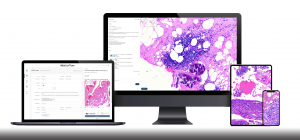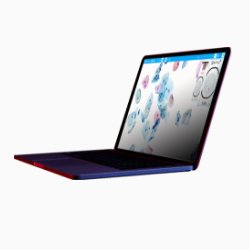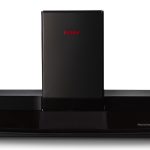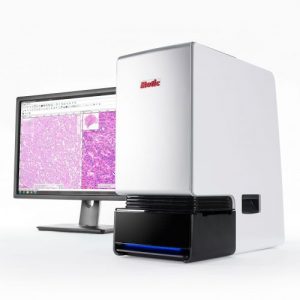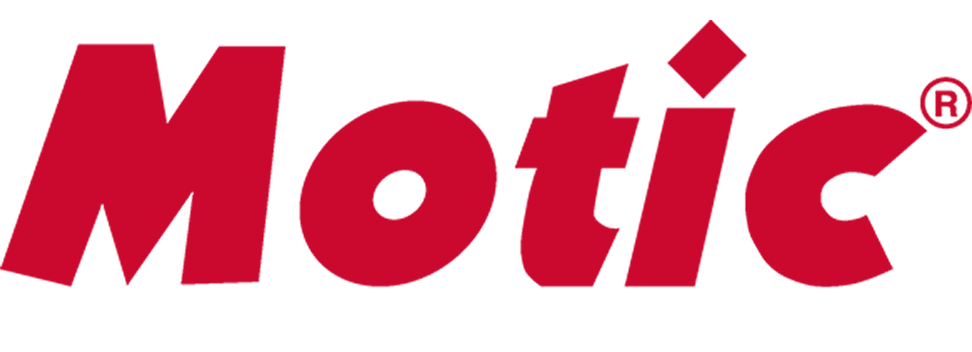The Motic Digital Pathology team had an incredible time at this year’s USCAP annual meeting in National Harbor, Maryland! Our Director of Digital Pathology, Nicholas Chan, has the following reflections to share from our time at the conference:
USCAP 2019 for Motic began with the Chinese American Pathologists Association (CAPA) meeting, which Motic has proudly been sponsoring since 2012. This year, I had the opportunity to recognize a group of international pathologists with the CAPA-Motic Abstract Award for their work driving innovation and creating new knowledge in the field.
Innovation was the theme of the week as a whole, in line with USCAP’s “Unlocking Your Ingenuity” tagline for the 2019 conference. From our time in the Exhibits Hall, it was undeniable that the digital pathology revolution is already here, opening more doors than ever before for international cooperation, early detection, and AI-enabled cancer diagnosis. The biggest question in our field today is no longer “Why should we use digital pathology” but rather “How do we integrate digital pathology?”
Clinicians might already be on board with the idea of digital pathology, but they still need to convince key decision-makers in their hospitals that these investments are smart choices with clear returns. Many of the doctors we talked to raised practical concerns about how easily their IT departments could integrate software for whole slide imaging and teleconsultation, as well as how they could start implementing digital pathology without sinking hundreds of thousands of dollars upfront.
To answer these questions, we must approach digital pathology in varied, application-specific ways that make obvious, measurable differences for daily caseloads and workflows. I believe that one reason our remote frozen section suite for teleconsultations made such a big splash all three days of the tradeshow was because pathologists could immediately understand its intuitive user interface and experience for themselves how easy it can be to pilot a system remotely. It was very gratifying to hear doctors say that the product design revealed how much we understand their needs since our team solicited clinician feedback at every stage of development.
I remain convinced that this listening-first approach to developing a product is the way to tackle the remaining significant roadblocks to the widespread adoption of telemedicine. My takeaway from our conversations and from the enthusiastic reception that met FS-Live is this: as an industry, we have a mandate to provide clear roadmaps for implementation, easily integrated software and image management systems, and scanners at entry-level price points to address the needs of our global market.
Along another line of ingenuity, I was excited by the increased number of AI companies present at USCAP this year. Machine learning is clearly on the cusp of some major breakthroughs that will profoundly impact the digital pathology space. We had many exciting conversations with the various AI companies exhibiting at the show floor, but also an equal number of conversations (if not more!) with prospecting AI start-ups that did not have booth space. Finding the right partners is a very important step for our budding industry, and I look forward to continuing discussions with these companies about scanner integration and data validation.
Finally, USCAP is always a great time to catch up with old friends! We were thrilled to see familiar faces from our collaboration with the ASCP’s Partners for Cancer Diagnosis and Treatment in Africa coalition. Doctors from Tanzania, Rwanda, and Duke University who consult with each other daily via our MoticFlow platform came by our booth to say hello, and it was inspiring to hear from them how our system is making a difference in their communities. Digital pathology has an enormous ability to enable global collaboration between practitioners, and this partnership with ASCP is one of the global projects that we’re proud to be part of.
In all, this year’s USCAP evidenced clearly just how quickly the digital pathology revolution is moving forward. Motic came away from the conference more excited and energized than ever for continuing our work of making digital pathology a practical reality for doctors, researchers, and hospitals everywhere!

